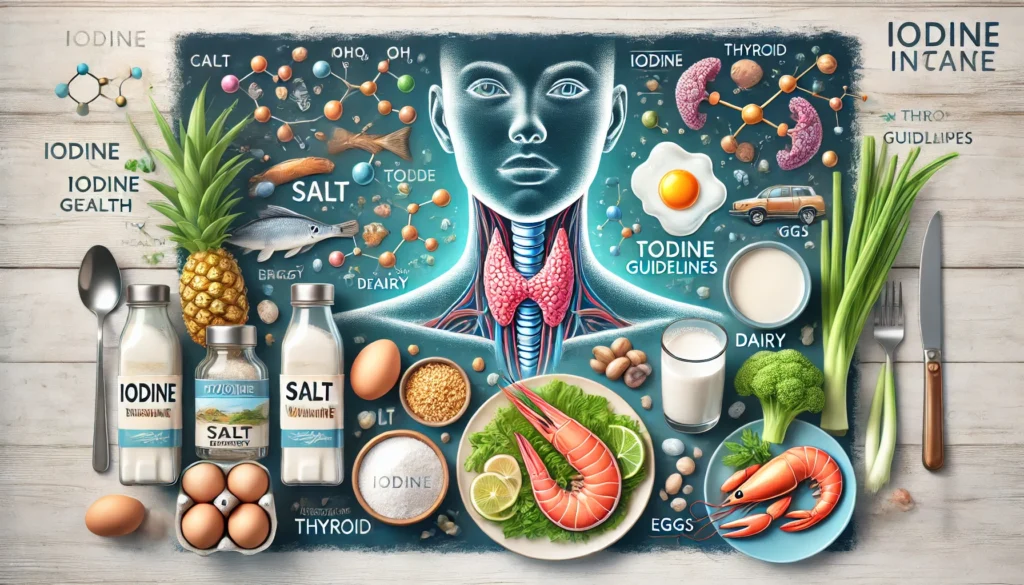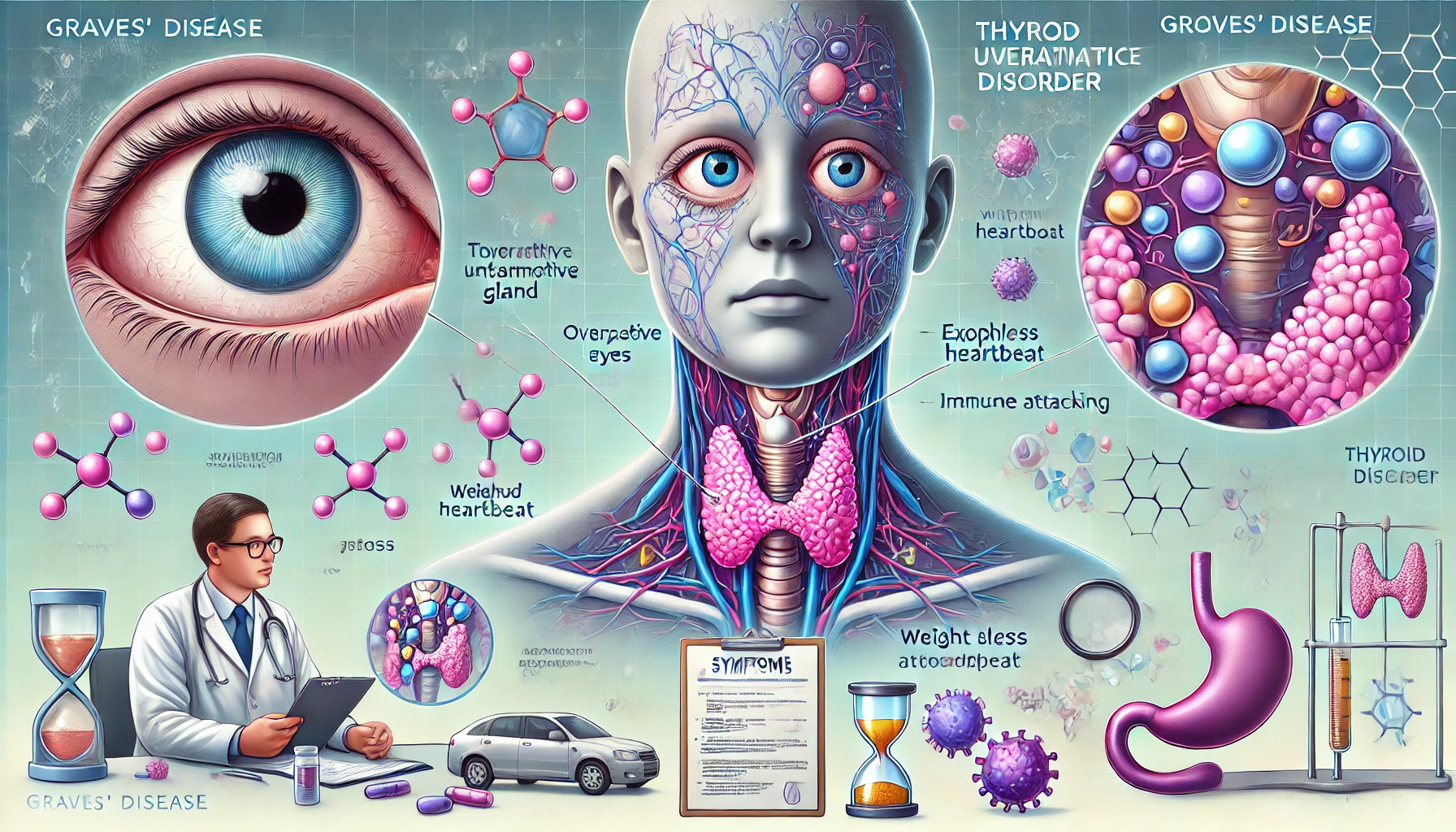Description
Graves disease represents an autoimmune disorder that mainly impacts the thyroid gland, the butterfly-shaped structure in the human neck that secretes hormones that control metabolism. Graves’ disease is named after the 19th-century physician Robert Graves. He originally described it as the most prevalent reason behind hyperthyroidism, a condition in which the thyroid gland becomes hyperactive and overproduces thyroid hormones. This autoimmune condition is characterized by symptoms such as weight loss, rapid heartbeat, irritability, and heat intolerance.
Around 20–30% of people with Graves’ disease additionally acquire thyroid eye disease (or TED), which is characterized by symptoms connected to the eyes, such as proptosis, irritated eyes, and problems with vision. An autoimmune reaction that affects the tissues and muscles surrounding the eyes, resulting in swelling and inflammation, is the cause of TED. Comprehending the complexities of Graves’ disorder and associated ocular presentations is essential for efficient handling and enhancing the standard of living for those impacted.
You May Also Like:
Chronic autoimmune urticaria: Description, Causes, and Treatment Protocol
IgA nephropathy / Berger’s disease: Description, Causes, and Treatment Protocol
Graves disease / thyroid eye disease: Description, Causes, and Treatment Protocol is an original (MedNewsPedia) article.
Possible Causes
Multiple immunological, genetic, and environmental variables interact intricately to cause Graves’ disease. There are several theories as to why Graves’ disease develops, yet its exact etiology is still unknown. These are some of the possible reasons for Graves disease:
Autoimmune Dysfunction: The primary feature of Graves’ illness is an aberrant immunological response, wherein the thyroid gland is incorrectly recognized as a threat by the immune system, leading to the production of autoantibodies, specifically thyroid-stimulating immunoglobulins (TSIs). Similar to thyroid-stimulating hormone (TSH), these TSIs cause hyperthyroidism by producing excessive amounts of thyroid hormones (i.e., thyroxine and triiodothyronine).
Genetic Predisposition: Autoimmune diseases have a large hereditary component. Graves illness is more common in people with a family connection to the autoimmune diseases Hashimoto’s thyroiditis and Type 1 diabetes. This propensity may be influenced by certain genes linked to immune system control.
Environmental Triggers: In people with a hereditary predisposition to the disorder, a variety of environmental events may precipitate or worsen Graves’ disease. Several factors have been linked to the initiation or exacerbation of the thyroid gland-targeting autoimmune response, including bacterial or viral infections, stress, particular medications, excessive iodine consumption, some medicines, and smoking.
Immunological Changes: Graves’ disease may arise as a result of modifications to the immune system’s control and operation. This entails intricate interactions between T and B lymphocytes as well as the generation of autoantibodies that specifically attack the thyroid-stimulating hormone receptor (TSHR) of thyroid cells.
Hormonal Influences: The beginning or worsening of Graves disease may be influenced by hormonal changes, such as those that take place during pregnancy, puberty, or menopause. Because of changes in hormones, pregnancy in particular might be an inducer for certain women.

Exacerbating and Mitigating Factors
Numerous aggravating and moderating factors might have an impact on Graves disease. Those who are aware of these variables may be able to better control their illness. The following are some of the Graves disease exacerbating and mitigating factors:
The exacerbating factors are:
Infections: Immune reactions can be triggered by specific diseases or illnesses, which may worsen Graves’ disease symptoms.
Stress: Graves’ disease symptoms may get worse under physical or mental stress. Stress can aggravate hyperthyroidism by causing hormonal imbalances.
Smoking: Smoke exposure and tobacco usage may intensify Graves’ disease. Smoking not only raises the chance of getting the illness but also exacerbates the symptoms.
Pregnancy: The hormonal fluctuations that occur during pregnancy can affect thyroid function and complicate the symptoms of Graves disease in certain women.
Iodine Intake: In some Graves’ disease patients, hyperthyroidism may worsen due to excessive iodine consumption via food or supplements.

The mitigating factors are:
Healthy Lifestyle: Eating a well-balanced diet, getting regular exercise, getting enough sleep, and quitting smoking all improve general health and may help control Graves’ disease.
Stress Management: Stress can worsen Graves disease, although it can be lessened using methods like yoga, mindfulness, meditation, and other stress-reduction exercises.
Continual Health Check-Ups: Regular check-ups and continuing monitoring with medical professionals are needed to evaluate thyroid function and modify treatment as needed.
Medication Adherence: To manage and stabilize thyroid hormone levels, ongoing compliance with recommended anti-thyroid drugs or other treatment strategies is essential.
Limiting Foods with High Iodine Content: In Graves’ disease, hyperthyroidism can be made worse by consuming too much iodine. It could be advantageous for certain people to consume fewer items high in iodine, like iodized salt and seaweed.

Standard Treatment Protocol
Following are the usual steps in the conventional management of Graves’ disease:
Anti-thyroid Medications: Propylthiouracil (PTU) and methimazole (Tapazole) are frequently administered to lower thyroid hormone production. They function by preventing the thyroid gland from using iodine to make hormones.
Radioactive Iodine Therapy (RAI): To reduce hormone production, this treatment entails taking radioactive iodine orally, specifically targeting and killing thyroid cells. Although it is frequently utilized as a last resort, it might cause hypothyroidism, necessitating lifetime thyroid hormone replacement.
Thyroidectomy (Surgery): In severe situations, surgical excision of part or all of the thyroid gland might be advised when other therapies are ineffective. This method necessitates lifetime thyroid hormone replacement medication and includes risks and consequences, including harm to surrounding structures.
Beta-Blockers: For the treatment of hyperthyroidism symptoms such as anxiety, tremors, and a fast heartbeat, doctors may prescribe propranolol or atenolol.
Treatment Options
Alternative approaches for addressing Graves disease and TED attempt to relieve symptoms, promote general health, and maybe increase the efficacy of primary treatments. They can be used in addition to normal medical therapies. The following are a few alternatives for supplementary treatment:
Nutritional Supplements: Although dietary supplements by themselves cannot treat Graves’ disease, they may help control symptoms and promote general health. The following dietary supplements have been taken into consideration for the treatment of Graves’ disease:
Vitamin D
Research suggests a possible connection between autoimmune illnesses and vitamin D deficiency. Vitamin D is essential for immunological function. Sufficient amounts of vitamin D can help regulate the immune system and are vital for general health. Maintaining adequate amounts of vitamin D may be beneficial for autoimmune diseases, such as Graves’ disease.
Omega-3 Fatty Acids
Supplements containing omega-3 fatty acids, which have anti-inflammatory qualities, may help treat autoimmune diseases. According to certain research, omega-3 fatty acids might be able to control the immune system’s reaction and decrease inflammation in autoimmune disorders.
Selenium
The metabolism of thyroid hormone and antioxidant mechanisms both require selenium, an important trace mineral. Enzymes that control thyroid function contain this essential component. An anti-inflammatory pill may help lessen the inflammation linked to autoimmune thyroid disorders, such as Graves’ disease, according to certain research.
Zinc
Thyroid hormone synthesis and immunological function both depend on zinc, an important mineral. Normal thyroid function requires adequate zinc levels. As per certain studies, supplementing with zinc may help enhance immunological function and perhaps help treat thyroid disorders.

Lifestyle Modifications: These include the following:
Stress Management
Graves’ disease symptoms may be lessened by practicing stress management techniques like yoga, meditation, or mindfulness.
Complementary Therapies: This covers the methods of acupuncture. Acupuncture treatments have been shown to alleviate some Graves disease symptoms for some patients, but further research is required to confirm this treatment’s effectiveness.
Herbal Remedies: The use of natural and herbal medicines for Graves’ illness should not be substituted for conventional medical care, despite the possibility of certain advantages. The following are some herbal and natural therapies that have been investigated for possible benefits in the management of Graves’ disease:
Ashwagandha (Withania somnifera)
An adaptogenic herb, ashwagandha has long been used to enhance general well-being and reduce stress. Ashwagandha may help control immune system function, lessen stress, and balance hormone abnormalities, according to some research. Through assisting in stress management, these qualities may provide indirect benefits to those with autoimmune diseases such as Graves’ disease.
Bugleweed (Lycopus europaeus)
Herbal remedies using bugleweed have long been used to treat thyroid issues. According to certain research, bugleweed may help control hyperthyroidism symptoms and lower thyroid hormone levels by blocking the action of TSH (thyroid-stimulating hormone).
Guggul (Commiphora wightii)
In traditional Ayurvedic medicine, guggul, a resin derived from the Mukul myrrh trees, is employed. Guggul may have antioxidant and anti-inflammatory qualities that make it useful in the treatment of autoimmune diseases, according to certain research.
Lemon Balm (Melissa officinalis)
Traditionally utilized for a variety of purposes, lemon balm is well-known for its relaxing effects. Lemon balm may help regulate an overactive thyroid while reducing thyroid hormone levels, based on several studies. It is also well known for having anti-stress qualities, which may help control Graves’ disease exacerbations brought on by stress.
However, it is imperative to remember that to make sure adjunct treatments are safe and suitable and enhance each patient’s regular treatment plan, they should be reviewed and planned with healthcare specialists. Each person may respond differently to adjunct therapies, so it’s important to customize their use to the unique needs of each patient and keep an eye out for any possible interactions or negative effects.
Conclusion
Graves’ disease, often accompanied by thyroid eye disease (TED), is a complex autoimmune disorder requiring a multifaceted approach to management. While its exact causes remain uncertain, the interplay of genetic predisposition, immune dysfunction, and environmental triggers plays a critical role in its onset. Standard treatment protocols, including anti-thyroid medications, radioactive iodine therapy, and thyroidectomy, remain the cornerstone of managing hyperthyroidism and its related symptoms. Adjunctive therapies, such as lifestyle modifications, stress management, and targeted nutritional supplements, can provide additional support, helping to improve patient well-being and reduce inflammation. Integrating these strategies with careful medical supervision ensures a comprehensive approach that addresses both the systemic and ocular manifestations of Graves’ disease. Continued research into innovative therapies and personalized treatment options offers hope for improved outcomes and enhanced quality of life for those affected.

Additional resources for further reference
https://www.nature.com/articles/s41572-020-0184-y
https://www.intechopen.com/chapters/76867
https://onlinelibrary.wiley.com/doi/full/10.1111/cen.14296
https://www.sciencedirect.com/science/article/abs/pii/S1530891X20483909
Important Note: The information contained in this article is for general informational purposes only, and should not be construed as health or medical advice, nor is it intended to diagnose, prevent, treat, or cure any disease or health condition. Before embarking on any diet, fitness regimen, or program of nutritional supplementation, it is advisable to consult your healthcare professional in order to determine its safety and probable efficacy in terms of your individual state of health.
Regarding Nutritional Supplements Or Other Non-Prescription Health Products: If any nutritional supplements or other non-prescription health products are mentioned in the foregoing article, any claims or statements made about them have not been evaluated by the U.S. Food and Drug Administration, and such nutritional supplements or other health products are not intended to diagnose, treat, cure, or prevent any disease.


